
Even before its Indian release, The Lunchbox is one of the most-awaited movies coming up, thanks to superb reviews floating around.
Its leading actor Irrfan, who also co-produces the film, claims its films like these that made him want to become an actor.
In a long chat with Sonil Dedhia, Irrfan bares his heart, and also tells us what he would get in his lunch box.
What made you sign up for The Lunchbox?
I got a film after a long time where I could explore romance. It’s good that once in a while comes a film that stays with you days after you’ve seen it.
It is these films for which I became an actor. The Lunchbox is a film that will remind me for a long time of the character I played, the emotion I projected and the story.
I prefer scripts that have the potential to become a part of people’s lives.
Did your wife Sutupa give you any special compliments for The Lunchbox?
My wife loved the film. It is one of the most romantic films she has seen in years.
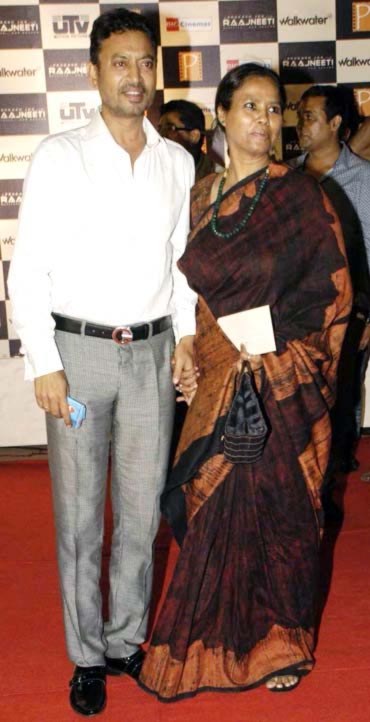
The film has the backdrop of the famous dabbawalas of Mumbai, who only exist in this city. Yet the film has received appreciation from all over the world.
The dabba culture is just a device to connect two people. But because this culture belongs to Mumbai and it’s a unique culture, it attracts many people.
What was interesting about Mr Fernandez, your character in The Lunchbox?
His emotion. There’s a very old-world charm to the romance in this film where you may fall in love with a person by just reading his/her letters.
Such romance existed in the olden times when you would go to a local mela (fair) and make eye contact with a girl that would remain with you for the longest time.
The Lunchbox is about two extremely common -- to the verge of being boring -- people and how romance blossoms between them.
How did you prepare for this character?
I modelled this character on my uncle who would change three transports to get to his office. He would take a bus from DN Nagar to Andheri station, take a train to Churchgate and then take a bus all over again to reach his office.
I used to observe how he would face the peak hour rush.
If you notice, daily commuters all bear the same expression. It’s almost as if daayan ne sabka khoon choos liya ho! (Laughs) I can never forget these expressions! I wanted to essay such a character.
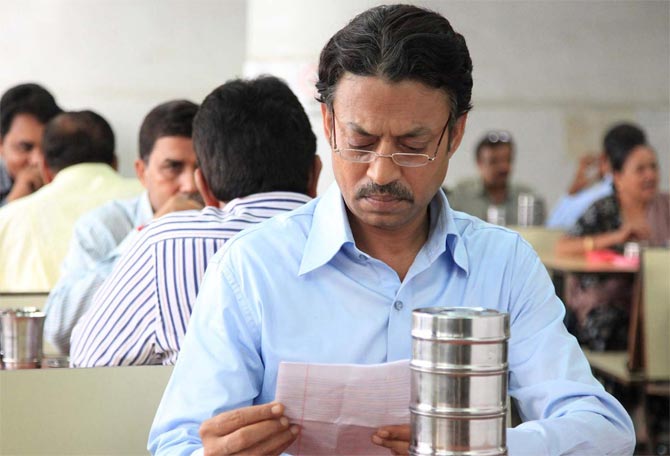
Do you remember carrying a lunchbox to school?
Yes. I always missed the aam ka aachar (mango pickle) in my dabba (lunchbox).
Humare ghar main kabhi nahi banta tha (We would never make pickle in our house). I would take it from my friends and eat it with my paranthas and roti with sabzi in my dabba.
Do you cook?
I love cooking. I like to experiment with dishes. I wish I could learn all the dishes that my mother makes.
I love the veg and non-veg kofte (meat balls). She also makes excellent shaami kebabs. And an amazing stew that we call Yakhni.
What is the most bizarre thing that you have put in your mouth?
(Thinks hard) I think castor oil. When I was young, every five to six months my mother would make me drink castor oil to clean the system.
We would also go on a seven-day Kadha (brew of herbal extract) diet. We would have Kadha and eat non spicy food. The Kadha was so sour that it would leave a bad aftertaste (laughs).
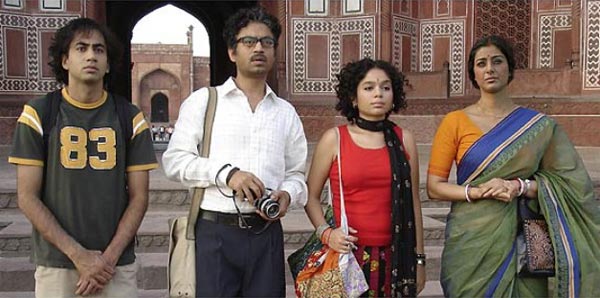
When did you realise that you wanted to co-produce this film?
It was a very gradual process. I wanted to produce films that I believe in. I am not the only producer of The Lunchbox so the entire burden is not on me.
I was looking forward to turning into a producer because you come across films you want to have a control over right till they hit the screens.
You are among the most desired actors in the Hindi film industry right now. Is it difficult to turn down filmmakers?
Initially I used to think, let’s do a film with a certain filmmaker for the sake of it; he may rope you in for a big film later. But it never worked for me. If the story is not good I don’t do it, whether it’s a big filmmaker or small.
So was it an instant yes in the case of The Lunchbox?
I instantly said yes. The only thing I didn’t like was playing an old character all over again. You really have to make yourself feel like an old man physically as well as mentally and it takes a lot to get out of such a mould.
When I played an old man in The Namesake, it was really difficult to get that character out of my system.
Do you worry about being bracketed in old age roles?
Oh yes, and that’s why I keep experimenting.
So does that mean after this film if somebody offers you an old age character you would turn it down?
Yes. After Life Of Pi, a lot of people approached me to play a role in a similar age bracket but I turned them down.
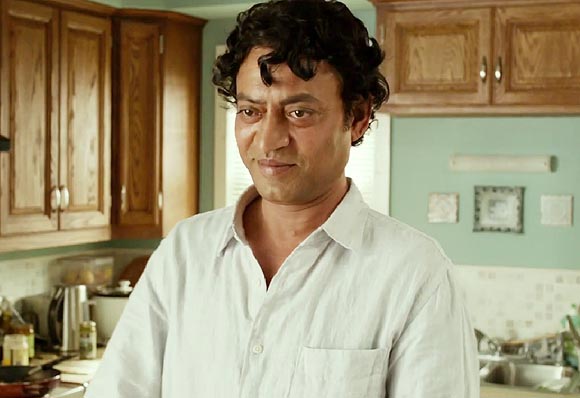
Is India still not open to such films? Why do small movies only come into the limelight when a person like Karan Johar attaches his name to it?
Films like The Lunchbox are also doing business. A different kind of cinema is making its presence felt and producers are realising the importance of small movies. Everybody wants to be associated with The Lunchbox.
I think Karan Johar will become popular because of this film and not the other way round.
Karan Johar didn’t come on board because this film needed a face value. He came on board because he liked the film so much that he wanted to be associated with it.
That doesn’t mean that the film will not benefit from his name, it will. And it’s really nice to see that a filmmaker who makes cinema of completely different sensibility eagerly wants to get on board this film.
Today, if Irrfan is associated with an art-house film it gets attention from the public. Do you think you’ve become a torch-bearer for such cinema?
I don’t understand the term art-house. For me, films are commercial art.
If there’s no commerce in the art, then it won’t have any value. A film has to make some profit.
Interestingly, the films I have been associated with have somehow ended up becoming the most successful films of that particular director. Whether it’s Ang Lee’s Life Of Pi or Danny Boyle’s Slumdog Millionaire or Tigmanshu Dhulia’s Paan Singh Tomar or Vishal Bhardwaj’s Maqbool.
Another reason I don’t understand the term art-house is because according to me a film should engage its audience. I do not like boring cinema. Films should be entertaining and engaging.
There are two types of films, A -- the time pass cinema which I do not like, and B -- the films that stay with you even after you’ve left the cinema hall.
So if at all there’s credibility attached to my name it’s only because I will do only those films that engage and entertain.
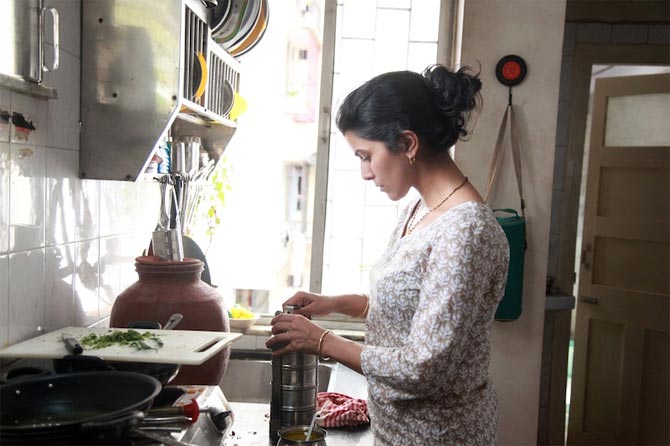
You’ve seen some of the most unexpected hits in Hindi cinema; did you expect such a windfall for The Lunchbox?
The market for this film is the whole world so one country alone cannot decide its fate. Having said that, the film has already recovered its money with the marketing it has had and the producers that have come on board.
In our country, a film’s success is measured by the money it makes on the first weekend. But I say do not judge a new bride based on the dowry she gets.
The success of The Lunchbox will be calculated by the many lives it has touched the world over and in the unlikeliest of places where it gets a release.
The film was well received at the Cannes Film Festival and got a standing ovation. Apparently, you were teary-eyed with this response.
Yes, that’s because I too was watching the film for the first time.
Quite a few people walked out of the theatre mid-way and the director, Ritesh Batra, started wondering is the film that bad? The French producer then revealed that the people walking out of the theatre were all buyers who wanted to queue up to buy the film before anybody else does.
This was the first time that an Indian film got sold out worldwide within a day. Studios were lining up to buy the film.
We were targeting to give the film either to Fox Studios or Sony for the American market because these two studios rule the business there. But before we could arrange for the screenings, Sony had already bought the film!
We realised that the film has universal appeal and will connect with people globally. We also hope that at least this year a right film gets chosen for the Oscars from India.
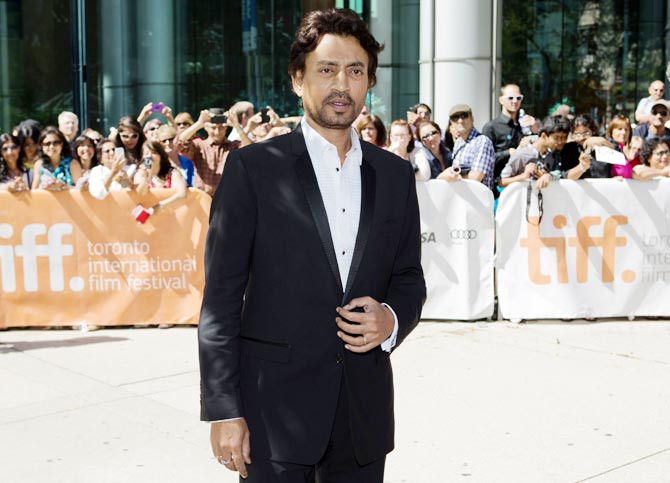
Have you ever paid a price for the stardom you’ve achieved?
It’s a very small price to pay for the success that I have. But, yes, I’ve lost my privacy.
There’s a small farm right ahead of my house where I grow vegetables. I always feel like walking up to there but it becomes impossible to do that as I get swarmed by people.
If I feel like playing tennis, my co-players want to click pictures with me instead of playing. If you are playing somebody is taking pictures or recording videos. You feel like roaming with your kids to watch movies etc but you can’t do that. So privacy gets affected.
Celebrities are soft targets. For example, for every story, people want celebrity quotes to put across their point.
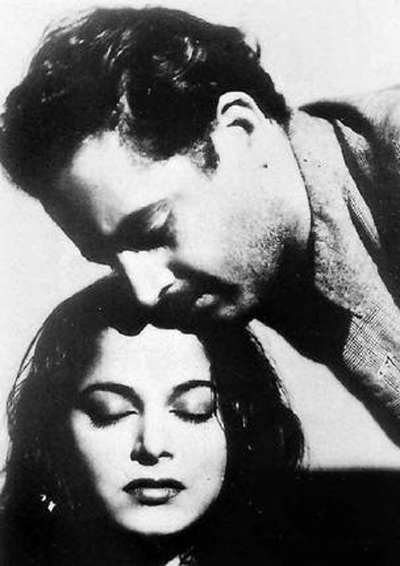
Waheeda Rehman in a recent interview said that her era was not the golden era in Indian cinema and the current time is the golden era.
I don’t think she could say something like that. I think Guru Dutt’s era was the golden era of Indian cinema.
At that time the whole country was hopeful; it was the birth of a new India. We had just achieved Independence and were in the process of building a new society. Everyone was inspired to do something.
There was a purity to filmmaking at that time when directors like Guru Dutt, Bimal Roy, Raj Khosla, Raj Kapoor made inspirational stories.
We have not touched that kind of brilliance in our cinema. I hope we can do it as right now Indian cinema is going through interesting times.
In the West, actors like George Clooney, Brad Pitt, Ben Affleck and others have progressed smoothly from doing commercial cinema to meaningful and different cinema. Out here, the three Khans (Shah Rukh, Salman and Aamir) are still stuck doing romantic films and bashing up villains. Is it really hard to make the transition here?
They have created an audience base in a certain way and the audience loves to watch them in a certain avatar.
In our cinema, ageing is not acceptable. Actors never play their age, they always hide their age. Five years ago a 45-year-old actor played a college student.
Our cinema has never been about awareness; it has always been about aspirations and escapism.